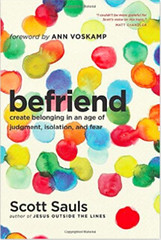Almost two years ago, I wrote that I fervently believe Scott Sauls’ first book should be in the hands of every single Christian without exception. Since then, Scott has become a trusted friend to my husband and I. When we have questions that are wrestling us down, when we need a prayer warrior in the middle of the night, a fellow pilgrim’s hand, a redeemed saint’s mind and a pastor’s heart, Scott is the friend we turn to. Scott has faithfully, time and time again, befriended us with deeply insightful wisdom, glasses-of-cold-water refreshment and encouragement, and an extraordinarily humble and vulnerable heart that beats like Jesus. Scott has written a second book, another must-read for the times we are in: Befriend: Create Belonging in an Age of Judgment, Isolation and Fear. The following words are a representation of this direly needed book. It gives us joy to welcome our friend, Scott Sauls, to the farm’s front porch today…
I love how Jesus related to damaged, condemned people. Don’t you?
A woman sins against God and is caught in the act of adultery. She wrecks a home. She brings shame upon herself and her community.
Then, pious men take her shame public. “Lawbreakers must not be tolerated,” they think. “She must be condemned for her behavior, cast out for her infidelities, shamed for her shameful act. She must be made into an example.”
This is what happens in a group of people who claim to have “sound theology” but are lacking in love.
A coliseum culture develops. Everyone rallies around a common enemy – the sinner. Robbers, evildoers, tax collectors, adulterers and adulteresses. And then the pouncing and the piling on. The shaming.
What’s wrong with the world? “Other people,” says the mob surrounding the adulteress. “What’s wrong with the world is other people…those who aren’t one of us.”
But not Jesus. Jesus, left alone with the adulterous woman, simply says to her two things:
I do not condemn you.
Now, leave your life of sin.
The order of these two sentences is everything.
Reverse the order of these two sentences and you’ll lose Christianity.
Reverse the order and you’ll lose Jesus.









With Jesus, preemptive declarations of grace and love and no-condemnation establish the environment for conversations about truth, morality, and ethics. It can be no other way.
After eighteen years of pastoral ministry, I have never met a person who fell in love with Jesus because a Christian scolded them about their morality or their ethics. Have you?
Once we were having a small prayer gathering with some friends. Before we started to pray, in came a husband and wife who had been invited by someone in the group. The man, who I will call Matthew, was very drunk, and his wife had this “been-through-war, can-somebody-please-help-me, I’m-dying-inside” look on her face.
As we prayed together, the intoxicated Matthew decided to chime in. His words were drunk words that formed an incoherent prayer that went on for over ten minutes. He petitioned for some of the strangest things:
God, protect us from the Klingons. God, I really want a Jolly Rancher right now, will you bring us some Jolly Ranchers? God, will you please move my bananas to the doghouse?
After the last person prayed and we all said “Amen,” everyone looked at me.
What will the pastor do?
Thankfully, I didn’t need to do anything because a woman from the group, full of grace and love and no-condemnation, offered Matthew a cookie.
As the woman was giving him a cookie and entertaining conversation about Klingons and such, others approached his wife, begging for insight on how they could help.
This little interaction, this way of responding with grace and love and no-condemnation first, became one of the most transformative experiences I have ever witnessed.
To make a long story short, the kindhearted offer of a cookie led to a tribe of people coming around the couple and their two young children, which led to a month of addiction rehab in Arizona – including flights and personal visits to and prayers and support offered at the rehab center by our little prayer group – which led to Matthew getting sober, which led to a restored home and marriage, which led to Matthew becoming a follower of Jesus, which led to him also becoming an elder in the church where I was pastor.
To this day, after eighteen years of pastoral ministry, Matthew may be the best and most impactful church elder I have ever worked alongside.
Anne Lamott tells it true: “It’s okay to realize that you’re crazy and very damaged. All the best people are.”
Grace and love must come before ethics.
No-condemnation must come before the morality discussion.
Because it is God’s kindness that leads to repentance, not our repentance that leads God to be kind.
Love – the broad embrace of the narrow path – will trigger some of the most life-giving experiences you’ll ever be part of.
In the end, the more conservative we are in our beliefs about the Bible – the more we truly believe every single word of it – the more liberal our loving will be.
Because the narrow path of Jesus? It always leads to a broad embrace.
How can we begin to live in such a way that Matthew stories become the norm versus the exception? How can we create environments in which this kind of love flourishes?
Here’s how:
We must first realize that LOVE is the environment that we ourselves are already living inside of.
Love has to be a Person to us before it can become a verb.
And the One who is Love Incarnate – Jesus – doesn’t just love us when we’re at our best. He also loves us when we are at our worst.
When we are caught in the act. When we fall asleep on Him instead of watching and praying with Him. When we deny Him three times. When we become His prosecutors and His persecutors. When we enter His prayer meetings drunk – drunk on a self-medicating substance like Matthew was, or something more subtle but no less destructive.
Drunk on our ambition.
Drunk on our greed.
Drunk on our grudges.
Drunk on our reputations.
Drunk on our pornographic imaginations.
Drunk on our religion and our virtue and our self-righteousness.
All of us, the lot of us. Drunk.
In our drunken places, Jesus draws near and asks, “Do you like cookies? May I get you one? Will you sit with me? How about rehab…may I accompany you there? May I pay the fee? May I come alongside you toward sobriety, then a new life, then a seat at my Table, then a job in my Kingdom? I went to the battlefield, I loved from the battlefield, to launch this love trajectory for your life. Protection from the Klingons. Sweeter than Jolly Ranchers. All you need is nothing. All you need is need.”
These words from one of my favorite hymns says it all:
Come ye sinners, poor and needy
Weak and wounded, sick and sore.
Jesus, ready, stands to save you,
Full of pity, joined with power…
Let not conscience make you linger,
Nor of fitness fondly dream.
All the fitness he requires
Is to feel your need of him.
How do we love like Jesus?
It starts with resting and receiving. It starts by stopping.
Perhaps we should stop trying to love like Jesus and instead, first learn what it means to be with Him, yes?
Because the more we are with Jesus, the more we will become like Him.
Love is caught more than it is achieved.
Get close to LOVE, and love tends to rub off.
Let’s pursue this path, the grace and love and no-condemnation path…shall we?
Then, the stage will be set to talk about things like truth, morality, and ethics, too.
Scott Sauls is senior pastor of Christ Presbyterian Church in Nashville, Tennessee. Before CPC, Scott was a lead and preaching pastor alongside Tim Keller with New York City’s Redeemer Presbyterian Church. He lives in Nashville with his lovely wife, Patti, and daughters, Abigail and Ellie. He blogs regularly—seriously bookmark him—and can be found being humble light on Twitter.
According to Tim Keller, Befriend is a “well-grounded project that looks at the entirety of Christian life through the prism of friendship.” Elisabeth Hasselbeck says that Befriend “provides real rescue from loneliness” and that “there could not be a better time for a book such as this one.”
I deeply concur. Befriend is one phenomenal book, direly needed for these times. Sharp. Informed. Culturally savvy. Biblical. This book will deeply change lives and start a befriend revolution. It’s powerfully changed me, and I’m sitting here revived in desperately parched places-feeling a bit of a holy hush. These pages echo the heart of God. This is an absolute must-read that I cannot recommend highly enough.








